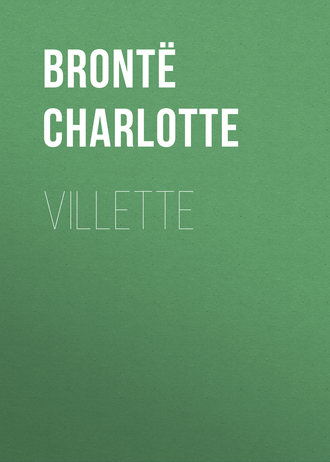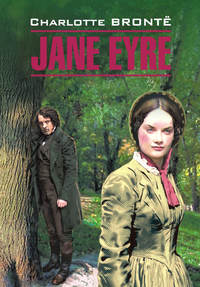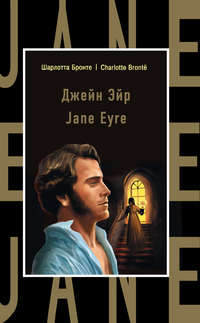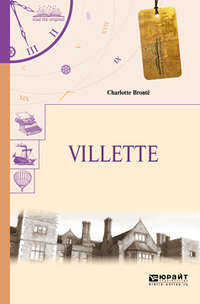 полная версия
полная версияVillette
"I black my boots," pursued he savagely. "I brush my paletôt."
"No, Monsieur, it is too plain; you never do that," was my parenthesis.
"Je fais mon lit et mon ménage; I seek my dinner in a restaurant; my supper takes care, of itself; I pass days laborious and loveless; nights long and lonely; I am ferocious, and bearded and monkish; and nothing now living in this world loves me, except some old hearts worn like my own, and some few beings, impoverished, suffering, poor in purse and in spirit, whom the kingdoms of this world own not, but to whom a will and testament not to be disputed has bequeathed the kingdom of heaven."
"Ah, Monsieur; but I know!"
"What do you know? many things, I verily believe; yet not me, Lucy!"
"I know that you have a pleasant old house in a pleasant old square of the Basse-Ville – why don't you go and live there?"
"Hein?" muttered he again.
"I liked it much, Monsieur; with the steps ascending to the door, the grey flags in front, the nodding trees behind – real trees, not shrubs – trees dark, high, and of old growth. And the boudoir-oratoire – you should make that room your study; it is so quiet and solemn."
He eyed me closely; he half-smiled, half-coloured. "Where did you pick up all that? Who told you?" he asked.
"Nobody told me. Did I dream it, Monsieur, do you think?"
"Can I enter into your visions? Can I guess a woman's waking thoughts, much less her sleeping fantasies?"
"If I dreamt it, I saw in my dream human beings as well as a house. I saw a priest, old, bent, and grey, and a domestic – old, too, and picturesque; and a lady, splendid but strange; her head would scarce reach to my elbow – her magnificence might ransom a duke. She wore a gown bright as lapis-lazuli – a shawl worth a thousand francs: she was decked with ornaments so brilliant, I never saw any with such a beautiful sparkle; but her figure looked as if it had been broken in two and bent double; she seemed also to have outlived the common years of humanity, and to have attained those which are only labour and sorrow. She was become morose – almost malevolent; yet somebody, it appears, cared for her in her infirmities – somebody forgave her trespasses, hoping to have his trespasses forgiven. They lived together, these three people – the mistress, the chaplain, the servant – all old, all feeble, all sheltered under one kind wing."
He covered with his hand the upper part of his face, but did not conceal his mouth, where I saw hovering an expression I liked.
"I see you have entered into my secrets," said he, "but how was it done?"
So I told him how – the commission on which I had been sent, the storm which had detained me, the abruptness of the lady, the kindness of the priest.
"As I sat waiting for the rain to cease, Père Silas whiled away the time with a story," I said.
"A story! What story? Père Silas is no romancist."
"Shall I tell Monsieur the tale?"
"Yes: begin at the beginning. Let me hear some of Miss Lucy's French – her best or her worst – I don't much care which: let us have a good poignée of barbarisms, and a bounteous dose of the insular accent."
"Monsieur is not going to be gratified by a tale of ambitious proportions, and the spectacle of the narrator sticking fast in the midst. But I will tell him the title – the 'Priest's Pupil.'"
"Bah!" said he, the swarthy flush again dyeing his dark cheek. "The good old father could not have chosen a worse subject; it is his weak point. But what of the 'Priest's Pupil?'"
"Oh! many things."
"You may as well define what things. I mean to know."
"There was the pupil's youth, the pupil's manhood; – his avarice, his ingratitude, his implacability, his inconstancy. Such a bad pupil, Monsieur! – so thankless, cold-hearted, unchivalrous, unforgiving!
"Et puis?" said he, taking a cigar.
"Et puis," I pursued, "he underwent calamities which one did not pity – bore them in a spirit one did not admire – endured wrongs for which one felt no sympathy; finally took the unchristian revenge of heaping coals of fire on his adversary's head."
"You have not told me all," said he.
"Nearly all, I think: I have indicated the heads of Père Silas's chapters."
"You have forgotten one – that which touched on the pupil's lack of affection – on his hard, cold, monkish heart."
"True; I remember now. Père Silas did say that his vocation was almost that of a priest – that his life was considered consecrated."
"By what bonds or duties?"
"By the ties of the past and the charities of the present."
"You have, then, the whole situation?"
"I have now told Monsieur all that was told me."
Some meditative minutes passed.
"Now, Mademoiselle Lucy, look at me, and with that truth which I believe you never knowingly violate, answer me one question. Raise your eyes; rest them on mine; have no hesitation; fear not to trust me – I am a man to be trusted."
I raised my eyes.
"Knowing me thoroughly now – all my antecedents, all my responsibilities – having long known my faults, can you and I still be friends?"
"If Monsieur wants a friend in me, I shall be glad to have a friend in him."
"But a close friend I mean – intimate and real – kindred in all but blood. Will Miss Lucy be the sister of a very poor, fettered, burdened, encumbered man?"
I could not answer him in words, yet I suppose I did answer him; he took my hand, which found comfort, in the shelter of his. His friendship was not a doubtful, wavering benefit – a cold, distant hope – a sentiment so brittle as not to bear the weight of a finger: I at once felt (or thought I felt) its support like that of some rock.
"When I talk of friendship, I mean true friendship," he repeated emphatically; and I could hardly believe that words so earnest had blessed my ear; I hardly could credit the reality of that kind, anxious look he gave. If he really wished for my confidence and regard, and really would give me his – why, it seemed to me that life could offer nothing more or better. In that case, I was become strong and rich: in a moment I was made substantially happy. To ascertain the fact, to fix and seal it, I asked —
"Is Monsieur quite serious? Does he really think he needs me, and can take an interest in me as a sister?"
"Surely, surely," said he; "a lonely man like me, who has no sister, must be but too glad to find in some woman's heart a sister's pure affection."
"And dare I rely on Monsieur's regard? Dare I speak to him when I am so inclined?"
"My little sister must make her own experiments," said he; "I will give no promises. She must tease and try her wayward brother till she has drilled him into what she wishes. After all, he is no inductile material in some hands."
While he spoke, the tone of his voice, the light of his now affectionate eye, gave me such a pleasure as, certainly, I had never felt. I envied no girl her lover, no bride her bridegroom, no wife her husband; I was content with this my voluntary, self-offering friend. If he would but prove reliable, and he looked reliable, what, beyond his friendship, could I ever covet? But, if all melted like a dream, as once before had happened – ?
"Qu'est-ce donc? What is it?" said he, as this thought threw its weight on my heart, its shadow on my countenance. I told him; and after a moment's pause, and a thoughtful smile, he showed me how an equal fear – lest I should weary of him, a man of moods so difficult and fitful – had haunted his mind for more than one day, or one month.
On hearing this, a quiet courage cheered me. I ventured a word of re-assurance. That word was not only tolerated; its repetition was courted. I grew quite happy – strangely happy – in making him secure, content, tranquil. Yesterday, I could not have believed that earth held, or life afforded, moments like the few I was now passing. Countless times it had been my lot to watch apprehended sorrow close darkly in; but to see unhoped-for happiness take form, find place, and grow more real as the seconds sped, was indeed a new experience.
"Lucy," said M. Paul, speaking low, and still holding my hand, "did you see a picture in the boudoir of the old house?"
"I did; a picture painted on a panel."
"The portrait of a nun?"
"Yes."
"You heard her history?"
"Yes."
"You remember what we saw that night in the berceau?"
"I shall never forget it."
"You did not connect the two ideas; that would be folly?"
"I thought of the apparition when I saw the portrait," said I; which was true enough.
"You did not, nor will you fancy," pursued he, "that a saint in heaven perturbs herself with rivalries of earth? Protestants are rarely superstitious; these morbid fancies will not beset you?"
"I know not what to think of this matter; but I believe a perfectly natural solution of this seeming mystery will one day be arrived at."
"Doubtless, doubtless. Besides, no good-living woman – much less a pure, happy spirit – would trouble amity like ours n'est-il pas vrai?"
Ere I could answer, Fifine Beck burst in, rosy and abrupt, calling out that I was wanted. Her mother was going into town to call on some English family, who had applied for a prospectus: my services were needed as interpreter. The interruption was not unseasonable: sufficient for the day is always the evil; for this hour, its good sufficed. Yet I should have liked to ask M. Paul whether the "morbid fancies," against which he warned me, wrought in his own brain.
CHAPTER XXXVI.
THE APPLE OF DISCORD
Besides Fifine Beck's mother, another power had a word to say to M. Paul and me, before that covenant of friendship could be ratified. We were under the surveillance of a sleepless eye: Rome watched jealously her son through that mystic lattice at which I had knelt once, and to which M. Emanuel drew nigh month by month – the sliding panel of the confessional.
"Why were you so glad to be friends with M. Paul?" asks the reader. "Had he not long been a friend to you? Had he not given proof on proof of a certain partiality in his feelings?"
Yes, he had; but still I liked to hear him say so earnestly – that he was my close, true friend; I liked his modest doubts, his tender deference – that trust which longed to rest, and was grateful when taught how. He had called me "sister." It was well. Yes; he might call me what he pleased, so long as he confided in me. I was willing to be his sister, on condition that he did not invite me to fill that relation to some future wife of his; and tacitly vowed as he was to celibacy, of this dilemma there seemed little danger.
Through most of the succeeding night I pondered that evening's interview. I wanted much the morning to break, and then listened for the bell to ring; and, after rising and dressing, I deemed prayers and breakfast slow, and all the hours lingering, till that arrived at last which brought me the lesson of literature. My wish was to get a more thorough comprehension of this fraternal alliance: to note with how much of the brother he would demean himself when we met again; to prove how much of the sister was in my own feelings; to discover whether I could summon a sister's courage, and he a brother's frankness.
He came. Life is so constructed, that the event does not, cannot, will not, match the expectation. That whole day he never accosted me. His lesson was given rather more quietly than usual, more mildly, and also more gravely. He was fatherly to his pupils, but he was not brotherly to me. Ere he left the classe, I expected a smile, if not a word; I got neither: to my portion fell one nod – hurried, shy.
This distance, I argued, is accidental – it is involuntary; patience, and it will vanish. It vanished not; it continued for days; it increased. I suppressed my surprise, and swallowed whatever other feelings began to surge.
Well might I ask when he offered fraternity – "Dare I rely on you?" Well might he, doubtless knowing himself, withhold all pledge. True, he had bid me make my own experiments – tease and try him. Vain injunction! Privilege nominal and unavailable! Some women might use it! Nothing in my powers or instinct placed me amongst this brave band. Left alone, I was passive; repulsed, I withdrew; forgotten – my lips would not utter, nor my eyes dart a reminder. It seemed there had been an error somewhere in my calculations, and I wanted for time to disclose it.
But the day came when, as usual, he was to give me a lesson. One evening in seven he had long generously bestowed on me, devoting it to the examination of what had been done in various studies during the past week, and to the preparation of work for the week in prospect. On these occasions my schoolroom was anywhere, wherever the pupils and the other teachers happened to be, or in their close vicinage, very often in the large second division, where it was easy to choose a quiet nook when the crowding day pupils were absent, and the few boarders gathered in a knot about the surveillante's estrade.
On the customary evening, hearing the customary hour strike, I collected my books and papers, my pen and ink, and sought the large division.
In classe there was no one, and it lay all in cool deep shadow; but through the open double doors was seen the carré, filled with pupils and with light; over hall and figures blushed the westering sun. It blushed so ruddily and vividly, that the hues of the walls and the variegated tints of the dresses seemed all fused in one warm glow. The girls were seated, working or studying; in the midst of their circle stood M. Emanuel, speaking good-humouredly to a teacher. His dark paletôt, his jetty hair, were tinged with many a reflex of crimson; his Spanish face, when he turned it momentarily, answered the sun's animated kiss with an animated smile. I took my place at a desk.
The orange-trees, and several plants, full and bright with bloom, basked also in the sun's laughing bounty; they had partaken it the whole day, and now asked water. M. Emanuel had a taste for gardening; he liked to tend and foster plants. I used to think that working amongst shrubs with a spade or a watering-pot soothed his nerves; it was a recreation to which he often had recourse; and now he looked to the orange-trees, the geraniums, the gorgeous cactuses, and revived them all with the refreshment their drought needed. His lips meantime sustained his precious cigar, that (for him) first necessary and prime luxury of life; its blue wreaths curled prettily enough amongst the flowers, and in the evening light. He spoke no more to the pupils, nor to the mistresses, but gave many an endearing word to a small spanieless (if one may coin a word), that nominally belonged to the house, but virtually owned him as master, being fonder of him than any inmate. A delicate, silky, loving, and lovable little doggie she was, trotting at his side, looking with expressive, attached eyes into his face; and whenever he dropped his bonnet-grec or his handkerchief, which he occasionally did in play, crouching beside it with the air of a miniature lion guarding a kingdom's flag.
There were many plants, and as the amateur gardener fetched all the water from the well in the court, with his own active hands, his work spun on to some length. The great school-clock ticked on. Another hour struck. The carré and the youthful group lost the illusion of sunset. Day was drooping. My lesson, I perceived, must to-night be very short; but the orange-trees, the cacti, the camelias were all served now. Was it my turn?
Alas! in the garden were more plants to be looked after, – favourite rose-bushes, certain choice flowers; little Sylvie's glad bark and whine followed the receding paletôt down the alleys. I put up some of my books; I should not want them all; I sat and thought; and waited, involuntarily deprecating the creeping invasion of twilight.
Sylvie, gaily frisking, emerged into view once more, heralding the returning paletôt; the watering-pot was deposited beside the well; it had fulfilled its office; how glad I was! Monsieur washed his hands in a little stone bowl. There was no longer time for a lesson now; ere long the prayer-bell must ring; but still we should meet; he would speak; a chance would be offered of reading in his eyes the riddle of his shyness. His ablutions over, he stood, slowly re-arranging his cuffs, looking at the horn of a young moon, set pale in the opal sky, and glimmering faint on the oriel of Jean Baptiste. Sylvie watched the mood contemplative; its stillness irked her; she whined and jumped to break it. He looked down.
"Petite exigeante," said he; "you must not be forgotten one moment, it seems."
He stopped, lifted her in his arms, sauntered across the court, within a yard of the line of windows near one of which I sat: he sauntered lingeringly, fondling the spaniel in his bosom, calling her tender names in a tender voice. On the front-door steps he turned; once again he looked at the moon, at the grey cathedral, over the remoter spires and house-roofs fading into a blue sea of night-mist; he tasted the sweet breath of dusk, and noted the folded bloom of the garden; he suddenly looked round; a keen beam out of his eye rased the white façade of the classes, swept the long line of croisées. I think he bowed; if he did, I had no time to return the courtesy. In a moment he was gone; the moonlit threshold lay pale and shadowless before the closed front door.
Gathering in my arms all that was spread on the desk before me, I carried back the unused heap to its place in the third classe. The prayer-bell rang; I obeyed its summons.
The morrow would not restore him to the Rue Fossette, that day being devoted entirely to his college. I got through my teaching; I got over the intermediate hours; I saw evening approaching, and armed myself for its heavy ennuis. Whether it was worse to stay with my co-inmates, or to sit alone, I had not considered; I naturally took up the latter alternative; if there was a hope of comfort for any moment, the heart or head of no human being in this house could yield it; only under the lid of my desk could it harbour, nestling between the leaves of some book, gilding a pencil-point, the nib of a pen, or tinging the black fluid in that ink-glass. With a heavy heart I opened my desk-lid; with a weary hand I turned up its contents.
One by one, well-accustomed books, volumes sewn in familiar covers, were taken out and put back hopeless: they had no charm; they could not comfort. Is this something new, this pamphlet in lilac? I had not seen it before, and I re-arranged my desk this very day – this very afternoon; the tract must have been introduced within the last hour, while we were at dinner.
I opened it. What was it? What would it say to me?
It was neither tale nor poem, neither essay nor history; it neither sung, nor related, not discussed. It was a theological work; it preached and it persuaded.
I lent to it my ear very willingly, for, small as it was, it possessed its own spell, and bound my attention at once. It preached Romanism; it persuaded to conversion. The voice of that sly little book was a honeyed voice; its accents were all unction and balm. Here roared no utterance of Rome's thunders, no blasting of the breath of her displeasure. The Protestant was to turn Papist, not so much in fear of the heretic's hell, as on account of the comfort, the indulgence, the tenderness Holy Church offered: far be it from her to threaten or to coerce; her wish was to guide and win. She persecute? Oh dear no! not on any account!
This meek volume was not addressed to the hardened and worldly; it was not even strong meat for the strong: it was milk for babes: the mild effluence of a mother's love towards her tenderest and her youngest; intended wholly and solely for those whose head is to be reached through the heart. Its appeal was not to intellect; it sought to win the affectionate through their affections, the sympathizing through their sympathies: St. Vincent de Paul, gathering his orphans about him, never spoke more sweetly.
I remember one capital inducement to apostacy was held out in the fact that the Catholic who had lost dear friends by death could enjoy the unspeakable solace of praying them out of purgatory. The writer did not touch on the firmer peace of those whose belief dispenses with purgatory altogether: but I thought of this; and, on the whole, preferred the latter doctrine as the most consolatory. The little book amused, and did not painfully displease me. It was a canting, sentimental, shallow little book, yet something about it cheered my gloom and made me smile; I was amused with the gambols of this unlicked wolf-cub muffled in the fleece, and mimicking the bleat of a guileless lamb. Portions of it reminded me of certain Wesleyan Methodist tracts I had once read when a child; they were flavoured with about the same seasoning of excitation to fanaticism. He that had written it was no bad man, and while perpetually betraying the trained cunning – the cloven hoof of his system – I should pause before accusing himself of insincerity. His judgment, however, wanted surgical props; it was rickety.
I smiled then over this dose of maternal tenderness, coming from the ruddy old lady of the Seven Hills; smiled, too, at my own disinclination, not to say disability, to meet these melting favours. Glancing at the title-page, I found the name of "Père Silas." A fly-leaf bore in small, but clear and well-known pencil characters: "From P. C. D. E. to L – y." And when I saw this I laughed: but not in my former spirit. I was revived.
A mortal bewilderment cleared suddenly from my head and vision; the solution of the Sphinx-riddle was won; the conjunction of those two names, Père Silas and Paul Emanuel, gave the key to all. The penitent had been with his director; permitted to withhold nothing; suffered to keep no corner of his heart sacred to God and to himself; the whole narrative of our late interview had been drawn from him; he had avowed the covenant of fraternity, and spoken of his adopted sister. How could such a covenant, such adoption, be sanctioned by the Church? Fraternal communion with a heretic! I seemed to hear Père Silas annulling the unholy pact; warning his penitent of its perils; entreating, enjoining reserve, nay, by the authority of his office, and in the name, and by the memory of all M. Emanuel held most dear and sacred, commanding the enforcement of that new system whose frost had pierced to the marrow of my bones.
These may not seem pleasant hypotheses; yet, by comparison, they were welcome. The vision of a ghostly troubler hovering in the background, was as nothing, matched with the fear of spontaneous change arising in M. Paul himself.
At this distance of time, I cannot be sure how far the above conjectures were self-suggested: or in what measure they owed their origin and confirmation to another quarter. Help was not wanting.
This evening there was no bright sunset: west and east were one cloud; no summer night-mist, blue, yet rose-tinged, softened the distance; a clammy fog from the marshes crept grey round Villette. To-night the watering-pot might rest in its niche by the well: a small rain had been drizzling all the afternoon, and still it fell fast and quietly. This was no weather for rambling in the wet alleys, under the dripping trees; and I started to hear Sylvie's sudden bark in the garden – her bark of welcome. Surely she was not accompanied and yet this glad, quick bark was never uttered, save in homage to one presence.
Through the glass door and the arching berceau, I commanded the deep vista of the allée défendue: thither rushed Sylvie, glistening through its gloom like a white guelder-rose. She ran to and fro, whining, springing, harassing little birds amongst the bushes. I watched five minutes; no fulfilment followed the omen. I returned to my books; Sylvie's sharp bark suddenly ceased. Again I looked up. She was standing not many yards distant, wagging her white feathery tail as fast as the muscle would work, and intently watching the operations of a spade, plied fast by an indefatigable hand. There was M. Emanuel, bent over the soil, digging in the wet mould amongst the rain-laden and streaming shrubs, working as hard as if his day's pittance were yet to earn by the literal sweat of his brow.
In this sign I read a ruffled mood. He would dig thus in frozen snow on the coldest winter day, when urged inwardly by painful emotion, whether of nervous excitation, or, sad thoughts of self-reproach. He would dig by the hour, with knit brow and set teeth, nor once lift his head, or open his lips.









